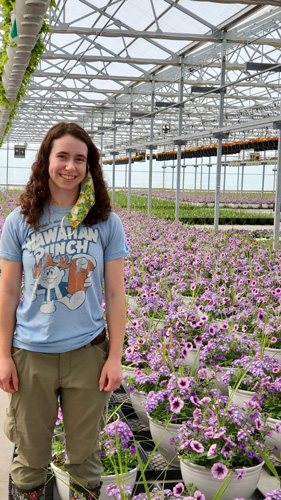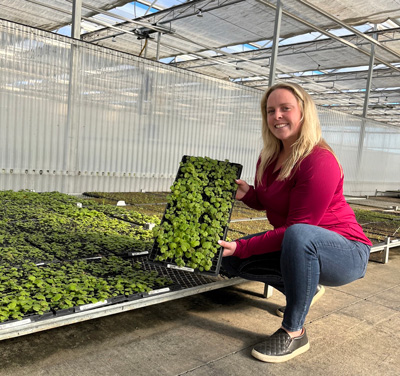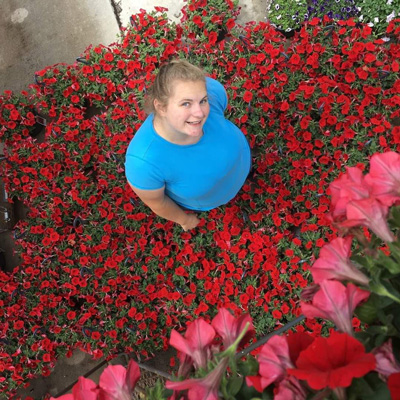12/1/2022
Interns Offer Fresh Perspectives—and Potential Hires
Julie Martens Forney

Today’s labor market is crazy. Help wanted signs are everywhere. It doesn’t matter if it’s retail, wholesale, manufacturing or transportation, there are endless job opportunities.
The horticulture industry is no different. Finding labor is the great equalizer, a common challenge shared by every level of the industry. If you have labor problems, you’re not alone—and if you don’t have labor issues, you’re among the lucky few.
The labor shortage is a complex puzzle that demands creative solutions. One answer lies in cultivating the next generation of workers, which is where the American Floral Endowment’s (AFE) internships come in. AFE sponsors three horticulture or floriculture intern programs that let students get on-the-job training for three to six months prior to graduation.
The program supplements a paid internship position with a monetary scholarship, awarded at completion of the internship. It’s a great way to train new workers in standard industry practices—and maybe find a possible hire for your business.
Since 2017, Skagit Horticulture in Mount Vernon, Washington, has hosted AFE-sponsored interns.
Rose Vogel, HR & Safety Manager, said, “We bring in interns to help scaffold their career, but also to acclimate them to the true environment here. Ultimately, we want to give them a first taste and see what they’re getting into—and we hope to hire them one day.”
North Creek Nurseries in Pennsylvania has hosted three AFE interns.
“Through this program, you get the cream-of-the-crop type person. They have goals, they’re focused and they have scholarships that can help them pay for a place to stay,” said Kathy McGinty, HR Manager. “We recognize that we need to do more to build our labor force and internships is one way to do that.”
This nursery has hired a former intern, Jaime Manlove, as Production Administrator, and she’s recently started to help coordinate internships with Kathy.
“By allowing students the opportunity to learn and grow here through an internship, it lets us be able to add another job applicant to the industry as a whole, whether we hire them or another operation does,” Jaime explained.
Why host an intern?
The reasons to bring an intern into your business include everything from gaining fresh perspectives on your company processes to letting your experienced team members pass on their wisdom and knowledge to the younger generation.
“Relationship building is a big part of the internship process. I find it a great reward to be a mentor,” Rose shared. “At Skagit, we encourage each department manager to be a mentor. Our CEO is a mentor, too. Hosting interns also brings the reward of knowing that we’re doing a community service in helping a student learn about our industry.”
 Pictured: Ava Melzak interned at Skagit Horticulture, where she focused on IPM. “I liked working with the beneficials, especially Dalotia, the roving greenhouse beetles,” she said. “For hanging baskets, I put in ‘lollipops’ of beneficial mites.”
Pictured: Ava Melzak interned at Skagit Horticulture, where she focused on IPM. “I liked working with the beneficials, especially Dalotia, the roving greenhouse beetles,” she said. “For hanging baskets, I put in ‘lollipops’ of beneficial mites.”
At North Creek, Jaime said their internship experience strives “to achieve a balance of hosting and learning. We give our employees a chance to train and host, while the intern is learning. It increases productivity across the board.
“Interns also help us learn new things. What they apply from classroom learning to real-life situations is amazing. Because they’re getting taught new things, they bring new viewpoints to the table.”
Rose agreed. “We’re a bunch of old-school farmers. Those young kids with their fresh perspectives help us to continue learning. One intern wondered why we’re not doing insect scouting using drones. Talk about a time saver! We haven’t implemented that yet, but comments like that spark ideas and make you think about efficiencies.”
Interns benefit, too
The student interns also reap a harvest of advantages from their real-world experience. Ava Melzak, a horticulture student at West Virginia University, interned at Skagit Horticulture.
“The biggest part of my job was integrated pest management,” she said. She tracked insects with sticky cards, sprayed pesticides and applied beneficial insects.
Ava’s main takeaway from her time at Skagit with its 200 acres is that she was able to clarify her career goals.
“I realized that I want to work on a smaller scale. I want to be involved in each step of the growing process. On such a large scale, you only get to do one thing at a time.”
Holly Barrus, a horticulture graduate from the University of Idaho and recipient of the AFE Intern of the Year Award, interned at Heartland Growers in Indiana, which has 60 acres of growing space under plastic, glass and poly.
“It was cool to get to see how different types of greenhouses functioned—different roof styles, venting styles and building materials,” she said.
 Pictured: Jaime Manlove studied landscape architecture at the University of Delaware and interned with North Creek Nurseries, where she’s working today. Five words she uses to describe internships are educating, growth (personal and professional), family, kindness and plants.
Pictured: Jaime Manlove studied landscape architecture at the University of Delaware and interned with North Creek Nurseries, where she’s working today. Five words she uses to describe internships are educating, growth (personal and professional), family, kindness and plants.
Coming from a non-ag background, the internship “solidified for me where I saw my future going,” she adds. “It took my bookwork, which was theoretical and if-based, and turned it into why—this is why you need to know about fertilizer, pore space, different soils, temperature for inducing flowering, etc. It connected everything together.”
For Jaime, the internship provided networking opportunities and the chance to visit different nurseries to learn how they did things.
“North Creek did that for me fully knowing I may never take a job with them, but they wanted to make sure I was allowed to meet other professionals in the industry,” she said. “That was really generous.”
Potential costs are worth it
When it comes to hosting an intern, the most obvious and direct cost is salary. Skagit pays interns a living wage and budgets for two interns each year. At North Creek, interns earn slightly less than starting wage.
“Because the students are under age 26, most are on their parents’ health insurance, so that potential cost is usually not in the equation,” Kathy explained.
Interns do need a place to live. “We help our interns find housing,” Kathy said. “We always reach out to employees first to see if someone has a room to offer. That has worked well in the past.”
Skagit works with realtors who handle Airbnbs and rental agencies, and also helps direct students to an area that matches their personal interests. “We want them to be happy,” Rose said. “We want to keep them.”
Grower hosts also have to invest time into their interns. In terms of work, Rose sees the process as more front-loaded, which is where HR comes in.
“Our goal is to get a sense of the interns—who they are and what their strengths are,” she explained. “We get their GPAs and talk to both Candice Musgrove [AFE Intern Program Coordinator] and the student’s faculty advisor. Then we massage their itinerary here to make sure it’s challenging and rewarding.”
The biggest resource a host needs to expend is time. To make the most of that investment, Jaime also recommended “being selective during the hiring process. You’ll spend time and money training the intern, so choose someone who demonstrates an interest in building a long-term relationship with your company and who you believe will be a good fit.”
Unexpected connections
Hosting an intern also creates other opportunities. During the course of the internship, the program provides reimbursement for each intern’s advising faculty member to visit them, which provides a great learning opportunity for faculty, helping them stay current with industry practices. Those faculty visits also forge relationships.
“Internships connect employers with universities and faculties that are also sharing different perspectives and helping our future,” Rose explained. “For instance, we’re looking for a couple section growers and we can ask the faculty to post the positions.”
 Pictured: For Holly Barrus, an AFE internship brought classroom learning to life. “It definitely set the tone for my life goals,” she said. Today, she works as an assistant grower for Ritter’s Garden & Gift in Spokane, Washington.
Pictured: For Holly Barrus, an AFE internship brought classroom learning to life. “It definitely set the tone for my life goals,” she said. Today, she works as an assistant grower for Ritter’s Garden & Gift in Spokane, Washington.
For Holly, being an intern “was a very rounded experience, which is something I really wanted. One thing I wish I had known going into the internship is how much of a support group it gives you. It led me to AFE’s Young Professional Council, which has given me a sense of belonging that I wasn’t expecting coming from doing an internship. That was the best surprise. Now I have people I can reach out to who can help, whether it’s job-related or fungus-related, it doesn’t matter. These people would help—we have a unique tie to each other.”
To learn more about AFE’s internship programs, visit endowment.org/internships or reach out to the Program Coordinator, Candice Musgrove (cmusgrove@afeendowment.org). Sign up to be a host location, and AFE will add your name to a running list of businesses that students can choose from. From there, the Endowment works with you to bring interns to your location.
Julie Martens Forney is a freelance writer with more than 25 years of experience writing about floriculture industry issues and gardening for consumers. To read her current bylines, check out ASCFG’s Cut Flower Quarterly, SAF’s Floral Management and HGTV.com.